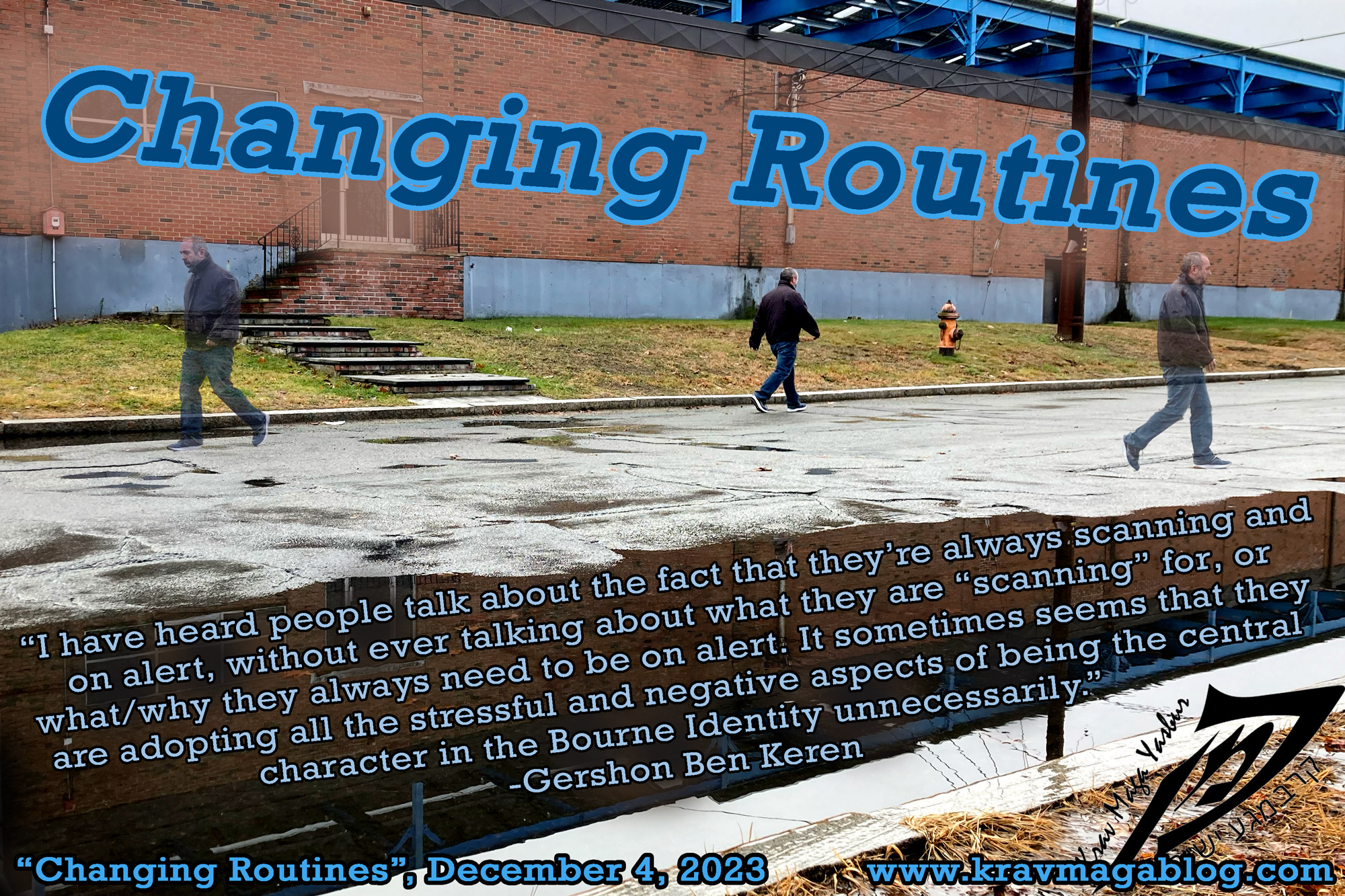Some pieces of safety advice intuitively seem to make sense e.g., don’t walk down dark alleys; when a mugger asks for your wallet throw it on the ground a way from you; always ask for identification before letting any workmen/contractors into your house etc. However, many pieces of advice and safety tips don’t stand up to any form of testing whether superficial or rigorous e.g., when we consider that most street robberies involve more than one offender how does throwing the wallet away from you actually give you an advantage? Another piece of advice I hear a lot involves mixing up your routines e.g., leave your house at different times to go to work, mix up the routes you take etc., basically never follow the same schedule. Whilst there are “merits” to do doing this in certain contexts, adopting this as a universal strategy is often burdensome and unnecessary from a personal safety perspective, and is an example of blindly/universally applying a tactic used in professional security (close protection, anti-surveillance etc.) needlessly and without context to personal safety. Often people who do this – using professional tactics in civilian contexts – do so with an air of smugness, believing themselves to be “operating” at a higher level than everyone else. I have heard people talk about the fact that they’re always scanning and on alert, without ever talking about what they are “scanning” for, or what/why they always need to be on alert. It sometimes seems that they are adopting all the stressful and negative aspects of being the central character in the Bourne Identity unnecessarily. There are times that we should up our awareness and be more “in the moment” however we shouldn’t be leaving our front doors imagining and looking for the sniper who’s been waiting for the right moment to take our life. In this article I want to look at when it may be suitable to mix up our routines, and when doing so may actually put us at a disadvantage.
Most violent offenses occur when our routine activities (going to work, going to the gym, going shopping etc.) intersect with the routine activities of a motivated offender (who may also be going to work, shopping and engaging in other leisure activities). There may have been times when this has happened to us, where we have found ourselves in the same time/space with individuals who have a history of offending but for whatever reason weren’t motivated to offend at that particular time e.g., we find ourselves in a parking lot, at the same time, as someone who habitually commits street robberies, but who in this moment is not motivated to do so because they recently committed an offense which netted them a good payday, and so they don’t feel the need – motivation – to engage in a robbery etc. However, if on a regular basis, our routine activities keep intersecting with such individuals, then statistically our chances of being victimized increase e.g., if you decide to go drinking at a pub which is known to have a long and regular history of violent incidents, there is a good chance that at some point you may become the target of violence i.e., you will be finding yourself in the same place and at the same time with individuals who have a propensity for fighting. If you’ve been walking to work for several years taking the same route without incident, this routine activity has not seen you intersect with a motivated offender’s routine activity. Space and time are six times more likely to predict future offending than the identity and characteristics of offenders. Conversely the absence of crime in a particular location and time is a good predictor of future safety. If you have not seen or experienced any offending on the route you have been routinely taking, why would you change this for the sake of being “random” and “unpredictable”? By being random and unpredictable you may find yourself in relatively unfamiliar locations that you don’t have a long history of experience in. In fact, changing the routes of your routine activities is putting you in a numerically greater number of locations, increasing the possibilities of you intersecting with a motivated offender’s routine activities.
If you have a history of taking a certain route to work (or from any location to any other) without incident, there is a good chance, as long as you have been aware of your surroundings, that you have established a good baseline of what the location looks like, and who is in it, at a particular time. For example, when I lived in London, I used to go to the gym each morning catching a bus at 5:45 AM. My house was near the start of the route and there would be the same three people waiting for the bus each morning. I only used to go a few stops before catching a tube train to the gym, but I knew everyone who got on, and so when someone “new” got on, I took notice of them. Something I could only do because I had a baseline. Part of situational awareness is being able to recognize when a situation changes e.g., a “new” person enters the environment. If I’d constantly been changing routes – walking to different bus stops, changing tube stations etc. – I wouldn’t have this baseline. Now, if someone had set up an ambush for me as I exited the bus at the stop I used to transfer to the underground rail, my consistent routine would have assisted them i.e., they would know where I would be at a particular time etc., however, I’m not Jason Bourne, who is consistently running from people. I recognize and understand that I’m just not that important to someone. This is not naivety but reality. Yes, I can mentally “create” such enemies that mean me harm, however if they do exist, there are plenty of other opportunities they have, beyond my “predictable” routines to intersect with me. I don’t need to change up the running routes I use because I don’t run in spaces and at times when/where I’m likely to cross paths with a motivated offender. Personal safety is more about how we use space safely, than the predictability of our movement(s).
When I worked in close protection we would change and mix up the routes we were taking because we knew there was a possibility due to the importance of the principle (the person we were looking after), that someone(s) may be planning to interact with them along a route. If I had an “important” job that potentially made me the target of a crime I would do the same e.g., if I was the key holder to a cash storage depot – a person of interest to criminals – I would in all likelihood mix up and change my route, recognizing that I am potentially vulnerable when in transit etc. I would also recognize that there are those skilled in anti-surveillance and so wouldn’t simply rely on this tactic alone. However, in day-to-day life, there are few of us who really have a need to keep changing the routes we take, though knowing how to do so should a threat present itself is a good skill to have.
Share:

Gershon Ben Keren
2.8K FollowersGershon Ben Keren, is a criminologist, security consultant and Krav Maga Instructor (5th Degree Black Belt) who completed his instructor training in Israel. He has written three books on Krav Maga and was a 2010 inductee into the Museum of Israeli Martial Arts.
Click here to learn more.

